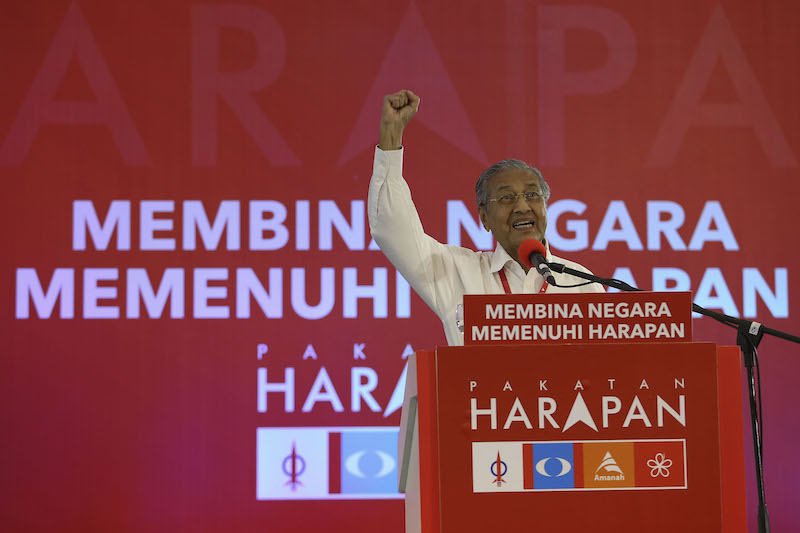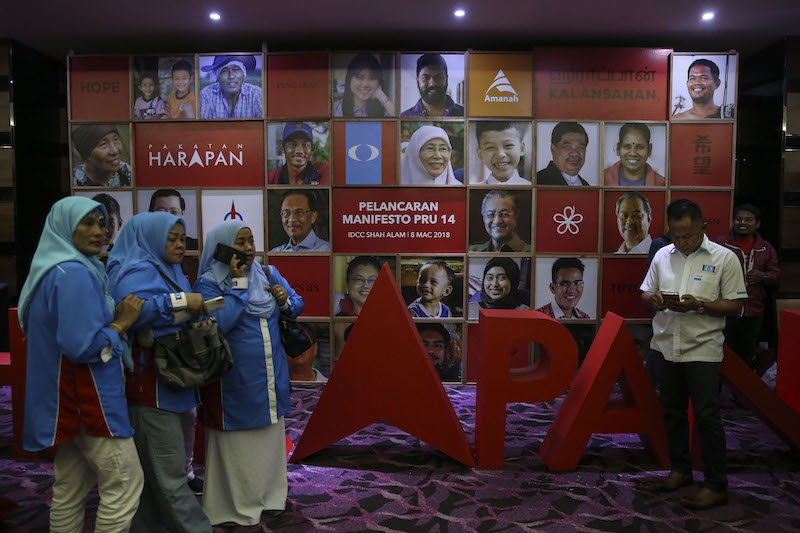KUALA LUMPUR, March 10 — Pakatan Harapan (PH) released its manifesto on Thursday, well ahead of any announcement on the 14th general elections (GE14).
The Opposition pact’s pledges however have since been criticised by both ruling coalition Barisan Nasional (BN) and Islamist party PAS, who accused PH of lifting some parts of its manifesto from their own.
In short, PH said it would take less from Malaysians by introducing tax cuts and lowering living costs, but at the same time give them more with greater financial aid and higher spending on facilities and infrastructure. It will also seek to boost the economy and trim leakages.
Here are some quick highlights by Malay Mail from the 203-page GE14 manifesto titled Buku Harapan — Membina Negara Memenuhi Harapan (Book of Hope: Building the Nation, Fulfilling Hopes) by PKR, DAP, Parti Pribumi Bersatu Malaysia, and Parti Amanah Negara:

1. Quick-fire ‘10 promises in 100 days’
PH gave itself a bold timeframe of just over three months to do 10 things if if it takes over Putrajaya:
I. Abolishing the Goods and Services Tax (GST) which was introduced at six per cent in April 1, 2015 — with a plan to replace it with a “fairer” Sales and Services Tax and “people-friendly and entrepreneur-friendly” tax.
ii. Reintroducing petrol subsidy which was scrapped from December 1, 2014, but targeting only eligible groups with motorcycles below 125cc and vehicles below 1,300 cc.
iii. Introducing Employees Provident Fund savings for housewives — with 2 per cent contribution by working husband, and RM50 monthly by the government.
iv. Abolishing the debts of Felda settlers.
v. Allowing federal study loan PTPTN’s borrowers to delay repayment until they earn RM4,000 monthly, and no more blacklisting of defaulters.
vi. Equalising and increasing monthly minimum wages to RM1,500 by the first term and reviewable every two years, with government to contribute half of the pay hike. The current minimum wage for the private sector are RM1,000 in Peninsular Malaysia, and RM920 in East Malaysia.
vii. Introducing RM500 annual subsidy per low-income family at registered private clinics
viii. Special Cabinet committee to review the Malaysia Agreement 1963. with a report within six months.
ix. Launching royal commissions of inquiry to probe 1Malaysia Development Bhd, Felda, MARA, Tabung Haji, and revamping their leadership.
x. Launching detailed studies of mega projects awarded to foreign countries.

2. 60 more promises in five years
The previous 10 promises overlap with PH’s 60 pledges that are spread out over five core sections:
i. Easing the people’s burden
ii. Reforming political and administrative institutions
iii. Boosting fair and just economic growth
iv. Restoring Sabah’s and Sarawak’s status based on Malaysia Agreement 1963
v. Building a nation that is inclusive, moderate and excellent at the global stage.
Some of the pledges are made with a longer-term view and expectation of PH being in power for two terms:
Among the more popular pledges were:
i. Abolishing highway tolls gradually, while introducing RM100 public transport pass in major cities and cutting excise duties on imported cars below 1,600 cc for first-time buyers.
ii. Providing one million affordable houses in 10 years.
iii. Making Internet connection speeds two times faster at half the price
iv. Keeping the 1Malaysia People’s Aid (BR1M), but with a new special agency to take over the scheme and introduce a non-partisan cash transfer system
v. Voting age to be lowered from 21 to 18, and automatic voter registration to be introduced.
vi. Limiting the post of prime minister, chief minister, and mentri besar to two terms. Enforcing that the prime minister cannot hold the finance minister portfolio, and to trim the Prime Minister’s Department from 10 to three ministers. Budget for the department to be trimmed from RM17 billion to RM8 billion.
vii. Half of government’s development budget in first three years will be for Malaysia’s five poorest states: Sabah, Sarawak, Kelantan, Terengganu and Perlis.
viii. Get two national parks recognised as Unesco World Heritage Sites, and working towards Malaysia making it into top 10 least corrupt countries in Transparency International’s Corruption Perception Index by 2030.
ix. Making national schools the school of choice, and encouraging academic freedom and university autonomy.
x. Abolishing Biro Tata Negara and National Service training programmes; Bernas’ monopoly on rice; mandatory death sentence; laws such Sedition Act, National Security Council Act, and the Universities and University Colleges Act.

3. Attention for the ‘special five’
PH gave special focus to five groups, including those particularly vulnerable or those who could contribute crucial votes: Felda settlers, the ethnic Indian community, women, youths, and the elderly.
Among other things:
i. Felda settlers were promised that abuses in the agency would be stopped with mishandled assets to be recovered, and its management to be revamped.
ii. The ethnic Indians were given the ambitious promise that the community’s problem of stateless Indians or Malaysia-born Indians without citizenship would be settled in 100 days.
iii. Women were told that they will get 90 days of maternity leave; and law changes that deter teen marriages, sexual harassments, and ensure gender equality.
iv. Youths were promised a RM500 incentive for each couple marrying for the first time below the age of 35; and free broadcast of English Premier League football matches over state broadcaster RTM.
v. The elderly will get laws against age discrimination at the workplace; and RM150 incentive each for everyone aged above 60.
BN, the ruling coalition that is also PH’s main political rival, has yet to unveil its election manifesto.



















